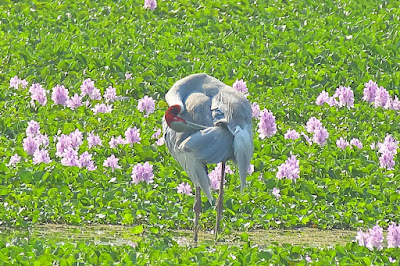Anomalies in Climate Patterns and Environmental Conditions are forcing a change in Migratory Patterns of Birds at the Basai Wetland in Gurgaon
 |
| The last of the Bar-headed Geese spotted on the 8th of May, 2021 |
When I visited the Basai Wetland recently, I didn't expect to see the last of the Bar-headed Geese. They generally leave by the month of March. It was surprising, indeed to see that last pair so late in the month. What I was seeing were stragglers, probably just matured ones that had separated from the rest of the flock. The summer months are too warm for Bar-headed Geese so they return to the colder climates of the Northern regions of Ladakh or even Central Asia and Mongolia. Fortunately, when I returned to the wetland today, they had left.
 |
| A female Bar-headed Goose spotted on the 8th of May, 2021 |
Bar-headed Geese are known to nest in the higher regions of Tibet where they lay a clutch of three to eight eggs. In the months of April and May. The presence of this pair of Bar-headed Geese is clearly an anomaly since they should have been elsewhere, the plateau of Tibet, Central Asia.
 |
| Pair of Lesser-Whistling Ducks spotted on the 8th of May, 2021 |
Another surprise spotting was that of a pair of Lesser Whistling Ducks. I have rarely seen these ducks at the Basai Wetland in Gurgaon. Though they are native to the sub-continent, their presence is probably in response to changes in weather patterns and availability of water. Strangely enough, spotting them in the almost dried up environs of the Wetland might be yet another anomaly linked to the limited resources in the surrounding areas. It was either a stopover for them or else, they had been forced to abandon their traditional nesting grounds due to a shortage of water and other natural resources.
 |
| Lesser-Whistling Ducks spotted on the 8th of May, 2021 |
Yet another surprise spotting was that of a pair of Sarus Cranes flying in to land on the remaining stretch of water at the Basai Wetland. I have not spotted Sarus Cranes for almost two years at the wetland, probably because of the unfavourable conditions prevailing there. Rampant construction, draining out of the water from the ponds and lakes and the dumping of construction waste and debris to fill up the catchment areas has made the wetland inhospitable for most migratory birds, and even the native species of birds. I have never seen Sarus Cranes flying so high in the sky, and although the lighting was unfavourable, I managed to click a few passable snaps.
 |
| Surus Cranes flying into the Basai Wetland on the 8th of May, 2021 |
The presence of the Sarus Cranes like that of the Bar-headed Geese and the Lesser-Whistling Ducks could be yet another anomaly caused by climatic and Geographic changes in their habitats. Migratory birds now stopover at the Basai Wetland en route to other better habitats. This is indeed a wake-up call for all of us to mend our ways since the damage caused to the Environment could have a ripple effect on us too.
 |
| A Sarus Crane at the Basai Wetland on the 8th of May, 2021 |

|
| One of a pair of Sarus Cranes preening its feathers. |
One of the more hardy native species of birds is the Pied Bushchat. Even this resident species of bird might soon be robbed of its habitat thanks to all the development activities taking place in the wetland. The Pied Bushchat that I spotted had alighted on the branches of a bush to have a hearty breakfast of a fat and juicy worm!
 |
A Pied Bushchat having a hearty breakfast of a fat and juicy worm.
|
The stripping away of the green cover and the drying up of the Basai Wetland will rob the Bushchats of their worms and grubs. As a result of this, even these native dwellers will be forced to abandon the wetland in search of better feeding grounds. The story of the Basai Wetland is a tragic story unfolding before our eyes. Unfortunately, there is nothing we can do unless the Forest Department, the Green Tribunal and the Government wake up to the situation before it becomes worse. Wetlands are like the kidneys of the body. When the kidneys stop functioning, life ceases!
 |
| A Pied-Bushchat spotted at the Basai Wetland on the 8th of May, 2021 |
 |
Pied Bushchat
|
To add insult to injury is the manner in which the wetland is being steadily destroyed. The draining out of the water from the ponds, dumping of construction waste and debris and rampant construction of residential buildings have taken a toll on the wetland. Sometimes I wonder if nature might not be claiming its pound of flesh by unleashing a dreadful Pandemic on all humanity. For these migratory and native bird species, we human beings (who are steadily destroying their habitats) are not less than the virus that has brought all Mankind to its knees. It is high time we did something about saving the environment and the animals and birds that it supports before they take their revenge on us. I would like to end this post with a photograph of what is happening at the Basai Wetland in Gurgaon.
 |
| Debris and construction waste being dumped at the Basai Wetland in Gurgaon |











No comments:
Post a Comment